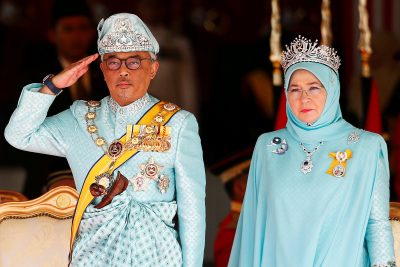As in earlier constitutional struggles in 1983 and 1993, Malaysia’s federal government under Prime Minister Mahathir Mohamad is confronting the royal power and claimed prerogatives of the traditional rulers of the federation’s nine sultanate states.
This struggle between the elected national government and the heads of the precolonial Malay ruling houses now turns upon several intensely contested issues. First, the ousting of the Johor chief minister and the royal assertion of the right to nominate his successor. Second, resistance by several of the sultans to the appointment of a duly selected new chief justice. And third, opposition to Malaysia acceding to the Statute of Rome treaty against war crimes, on the grounds that doing so might diminish Malay royal sovereignty.
Such tensions are a constant feature of modern Malaysian political life. As the standing of the once dominant Malay ruling party United Malays National Organisation (UMNO) has waned since the 12th general election (GE12) in 2008, the Malay sultans are increasingly playing a decisive backstage political role. In the defence of ‘Malay interests’, they are backed by a consortium of restless street-level Malay ethnocratic and ethno-sectarian forces.
These forces are eager to make — on behalf of the sultans but in the name of Malay supremacy — more expanded claims concerning the supposedly imperilled constitutional standing of the Malay royals. And as former prime minister Najib Razak stands trial on criminal charges, he and his now sidelined UMNO party (with whom many of these street-level forces are aligned) are joining the chorus upholding threatened Malay power as personified by the sultans.

They do so with a common objective: political destabilisation. They aim to undermine the recently elected Pakatan Harapan (PH) administration’s political authority and its ability to govern.
But the issue has been in play well before 2008. Since independence in 1957, Malaysia has faced the problem — ripe for political agitation — of the relation between national constitutional sovereignty and royal prerogative. Does the Federal Constitution concede the old sultanate royals any entitlements outside the Constitution and beyond its reach? Does it give them any broad and far-reaching (as distinct from narrow and technical) powers within the Constitution?
Historically, the answer is no. Like all the nations launched into postcolonial independence after World War II, Malaya and then Malaysia’s constitution rests upon the principle of popular national sovereignty. But ethno-supremacist and Islamist ideologues have emerged in more recent times asserting that the Constitution rests upon a different foundation: the doctrine of Islamically-sanctified Malay domination in a state governed by Sharia Law under Malay royal custodianship.
History tells its own story. After long opposing it, the old state Malay heads finally boarded the Merdeka (independence) train moments before it left the Colonial Office station without them. They suggested that independence was bestowed on the nation as their gift of royal grace and favour, and that they had now reposed their historic precolonial sovereignty within the new national political entity under their continuing customary patronage.
Along with the new royalist theorists who have emerged over recent years, they now argue that the precolonial sovereignty of the Malay sultans had remained intact and undiminished during the years of colonial rule, all the way back to 15th century Malacca. Their argument artfully conflates — or fatally fails to distinguish between — daulat, the cosmically-grounded aura of sanctity that traditionally infused Malay kingship and the person of the ruler, and kedaulatan, a modern term expressing the abstract idea of sovereignty in its jurisprudential sense.
Centrally important in the ‘new royalist’ doctrine are the rights and obligations of Malaysia’s head of state — the king, or Agong — as guarantor of the country’s Malay–Islamic authenticity. While the royal heads of the nine sultanate states enjoy a historic cultural standing that precedes the modern constitutions of their states, the position of the Agong — elected to five-year rotating terms by the nine rulers from among their own ranks — has no such pre-independence history. It is an artefact purely of the Federal Constitution itself, whose supremacy it is the Agong’s duty to personify and uphold.
Modern constitutional government is not merely government in accordance with the provisions of a constitution, but also government in accordance with the wishes of the elected representatives of the people. Yet in Malaysia, ‘We the Ruler’ has become entangled with ‘We the People’, and the attendant confusion has bedevilled Malaysian politics ever since. Exploiting that confusion is the key strategy of the PH government’s Malay adversaries.
Today’s battles are today’s, but the conflict between the elected PH government and royal power in Malaysia is driven by these historic disputes.
Under Mahathir, PH amassed sufficient popular support to win GE14 in 2018. But the PH bloc lacks the coherence and resolve to govern effectively. Should the PH government fail, there will be a terrible resentment-driven reversion. The old Malay–Islamic forces will return to rule with replenished determination — and royal blessing.
PH does not know how to succeed. Seeing that, its opponents are seizing opportunities — as in this clash over Malay royal power — to weaken it. They pose the question: how can the PH government possibly survive to win GE15 four years from now?
The idea of Malay royal power at the head of an increasingly Islamic state is central to Malaysian politics today. It has enormous mobilising power among a dominant yet resentful political majority with the psychological mindset, and resulting fears, of a threatened minority.
Dr Clive Kessler is Emeritus Professor of Sociology and Anthropology at the University of New South Wales.
-https://www.eastasiaforum.org



No comments:
Post a Comment
Note: Only a member of this blog may post a comment.